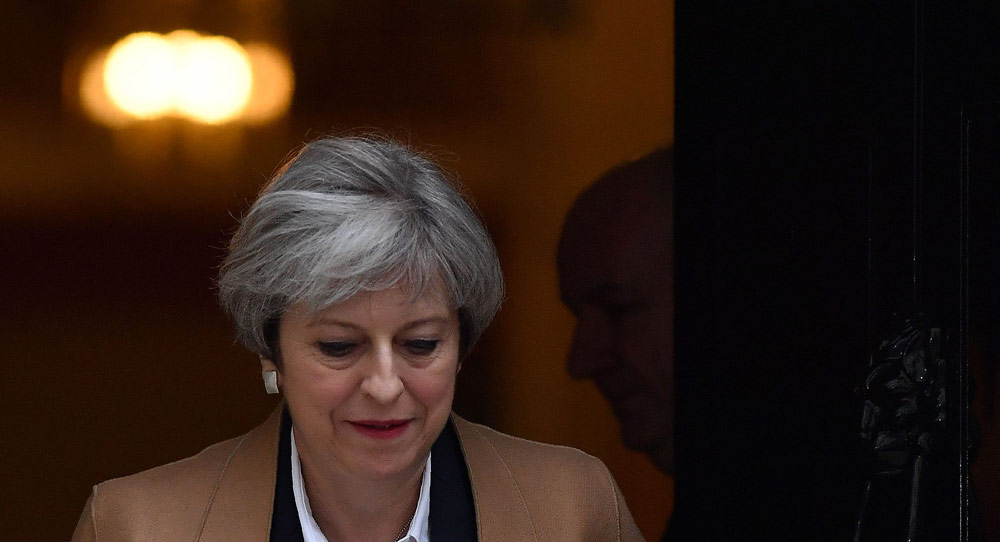One year ago, while Theresa May was enjoying her honeymoon with the public as the United Kingdom’s new prime minister, she had a plan. At its heart was the appointment of three pro-Brexit ministers to the key jobs in dealing with the UK’s withdrawal from the EU: Boris Johnson (foreign secretary), David Davis (the UK’s chief negotiator, as secretary of state for the new Brexit department), and Liam Fox (trade secretary).
If this trio did well, and the UK left the European Union in a manner that pleased voters and boosted the economy, she would be the British prime minister whose leadership steered the UK to a happy and prosperous future. If they failed, she could blame them for screwing up, sack them, and change course. After all, May had advocated a Remain vote (albeit in only a lukewarm way) during the 2016 referendum. By appointing the three leading Brexiteers within 24 hours of becoming prime minister, she could avoid the charge of having wanted to sabotage Brexit all along. Either way, she could emerge from the saga with her reputation enhanced or, at worst, dented only slightly.
For this heads-I-win, tails-I-don’t-lose-much strategy to work, Theresa May had to overcome just one hurdle, but it did not seem to be too difficult to do. She had to have a solid majority of MPs on her side. This spring, she decided that her sixteen seat majority (in the 650 seat House of Commons) was not enough. She called a general election, with her party 20 points ahead in the polls. A decisive victory over Jeremy Corbyn, Labour’s left-wing leader, seemed a cast-iron certainty.
As the world knows, she failed. She now leads a minority government. Her authority is gravely diminished. That need not have mattered in the long run if the heads-I-win half of her strategy paid off, and the UK left the EU in an orderly manner that protected jobs, investment, and living standards. However, that prospect is receding rapidly. The talks are going badly.
May’s problem now is that, if the talks continue to stall, she may be unable to sack or move any, let alone all, of her three Brexiteers, or stop the momentum toward a hard Brexit. Bluntly, her party would not let her push out Johnson, Davis, or Fox, precisely because the election result robbed her of her ability to do more or less what she wanted.
What makes things worse is that Johnson and Davis have been coming under mounting criticism. A recent op-ed article in The Times startled those who live in the Westminster bubble with the vehemence of its attack on Johnson. The editorial’s headline conveyed its thrust: “Our Foreign Secretary is an International Joke.” Vitriol in the press is nothing new. But Rachel Sylvester, the author of the article, does not go in for ad hominem abuse. She is one of the most respected, fair-minded, assiduous, and well-connected political commentators in Westminster. On the rare occasion she launches an outright attack on a senior politician, her judgement carries great weight.
Sylvester’s article reported what a wide range of political insiders and business leaders in both London and Washington were telling her. “Why has your prime minister appointed a fool as foreign secretary?” was a question she was asked frequently in America. She quoted one of Johnson’s fellow ministers in London saying: “There is not a single foreign minister [in Europe] who takes him seriously.” Very few Conservative MPs could be found to rebut Sylvester’s article, for most know it to be true.
If that wasn’t bad enough, David Davis came under attack from one of his own former advisers. In a series of tweets, followed up by a number of media interviews, James Chapman called Davis lazy, bullying, and ignorant of the detailed issues on which he was supposed to negotiate Brexit. Not surprisingly, Davis rejected the criticisms of his former aide; but once again, the validity of the attack was underlined by the scarcity of Conservative colleagues willing to say that Chapman had got it all wrong.
Had May secured the big majority she sought and expected, she could now sack Johnson and Davis. But were she to do so now, she would be taking a great risk. She might well provoke a formal challenge from Conservative MPs to her leadership. Under the party’s rules, it needs 48 of the party’s MPs—15 percent of the 317 parliamentarians in the House of Commons—to trigger a ballot. This is the last thing May wants, because she is well aware that she could very well lose the contest. Even if she does not provoke a formal challenge, support for her may simply ebb away to the point where she has to resign. She says she wants to lead her party into the next general election, but hardly any of her own backbench MPs believe she will last that long.
May knows all that. She knows she must tread carefully. In the end, she may be forced to act against Davis and/or Johnson. But she would rather avoid the huge risk that such a move would entail. So the good ship United Kingdom seeks to navigate the hazardous, rock-strewn waters of the Brexit negotiations with a nervous captain, two widely criticised helmsmen, and her 317-strong crew on the verge of mutiny. Nobody should be surprised if the vessel runs aground.
Peter Kellner is a journalist, political commentator, and former president of YouGov.











